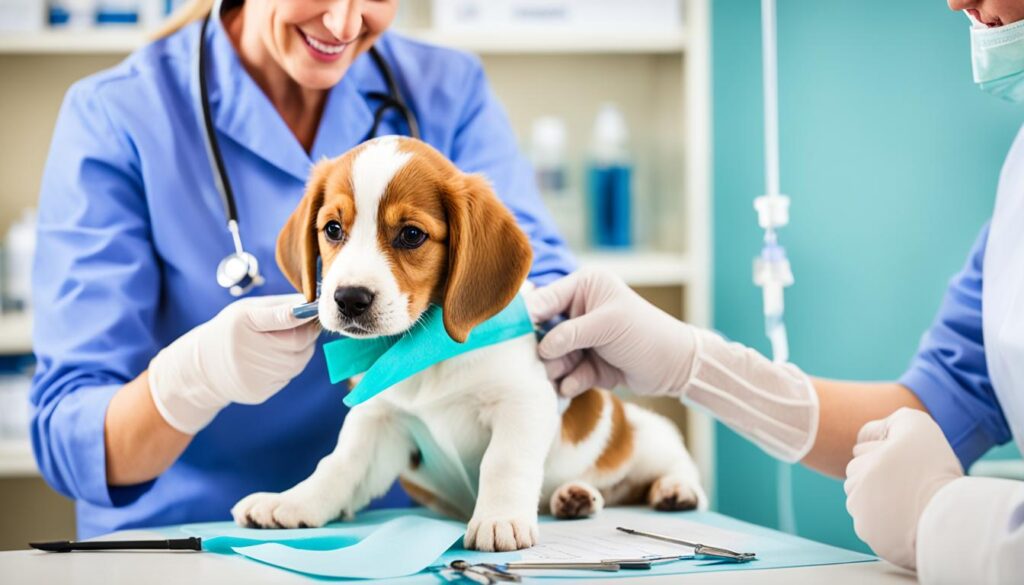
Vaccinations are a crucial part of ensuring the health and well-being of your new puppy. This comprehensive guide will provide you with all the necessary information about puppy vaccinations, including the vaccine schedule and the shots your puppy needs. By following this guide, you can ensure that your new companion is protected from potentially dangerous diseases.
Key Takeaways:
- Puppy vaccinations are essential for your pet’s health and protection.
- Core vaccines, such as distemper and parvovirus, are necessary for every puppy.
- Non-core vaccines may be recommended based on your puppy’s lifestyle and location.
- The rabies vaccine is required by law in most states.
- The ideal age to start vaccinations is around six to eight weeks.
What vaccinations does your new puppy need?
Regarding the health of your new puppy, vaccinations play a crucial role. Vaccinations protect your puppy from various diseases, ensuring their well-being and longevity. Understanding which vaccinations your puppy needs is essential in providing the utmost care.
Understanding core vs. non-core vaccines for puppies
There are two main types of vaccines for puppies: core and non-core. Core vaccines are considered essential and are necessary for all puppies, regardless of their lifestyle or location. These vaccines protect against highly contagious and potentially life-threatening diseases like distemper and parvovirus. Non-core vaccines, on the other hand, are recommended based on factors such as your puppy’s specific circumstances, geographic location, and exposure risks.
The pivotal role of the rabies vaccine and its legal requirements
The rabies vaccine is a critical vaccination for puppies and grown up dogs. This vaccine is essential for protecting your puppy from contracting rabies, a deadly viral disease, and is also required by law in most states. The legal requirement of the rabies vaccine ensures public safety and helps control the spread of the disease.
Distemper, parvovirus, and other critical vaccinations
In addition to core vaccines, other critical vaccinations are highly recommended for puppies. These vaccines protect against diseases such as distemper, parvovirus, hepatitis, and leptospirosis. Distemper is a viral disease that affects multiple systems in a puppy’s body, while parvovirus is a highly contagious and often fatal disease that attacks the gastrointestinal tract. Vaccinating your puppy against these diseases is essential for their health and well-being.
By ensuring your puppy receives the necessary vaccinations, including core and recommended non-core vaccines, you can provide them with a robust immune system and protect them from potentially dangerous diseases. Please consult your veterinarian to create a customized vaccination plan for your puppy based on their needs and circumstances.
Decoding the puppy vaccination schedule
Understanding the puppy vaccination schedule is essential to ensure your puppy receives the necessary shots at the right time. Vaccinations protect your puppy from potentially dangerous diseases and maintain their overall health.
When to start: The ideal age for the first round of vaccinations
The ideal age to start vaccinations for puppies is six to eight weeks. At this age, puppies have developed their immune system and are ready to receive their first round of vaccines. Following your veterinarian’s recommendations and scheduling the vaccinations is essential.
Timing and intervals between puppy shots
After the initial vaccinations, your puppy will need subsequent shots to ensure continued protection. The intervals between puppy shots will depend on the specific vaccines being administered. Generally, vaccinations are given regularly every three to four weeks until your puppy is around 16 to 20 weeks old. These intervals allow for the development of a robust immune response.
Transitioning from puppy shots to the grown up dog vaccination schedule
As your puppy grows and matures, it is essential to transition from the puppy vaccination schedule to the grown up dog vaccination schedule. grown up dogs require booster shots to maintain their immunity against certain diseases. These booster shots are typically administered annually or every three years, depending on the vaccine and your veterinarian’s recommendations. Following the grown up dog vaccination schedule is crucial to ensure that your dog remains protected throughout their life.
In summary, understanding the puppy vaccination schedule is essential for the health and well-being of your puppy. Starting vaccinations at the ideal age, following the recommended timing and intervals between shots, and transitioning to the grown up dog vaccination schedule will help ensure your furry friend receives the necessary protection and stays healthy.

Booster shots: What are they, and when are they necessary?
Booster shots are crucial in maintaining your puppy’s immunity to various diseases. These shots are additional doses of a vaccine that help reinforce the initial vaccine’s effectiveness and provide long-lasting protection against infectious diseases. While the initial vaccine primes your puppy’s immune system, booster shots serve as a reminder to ensure a strong and sustained immune response.
To understand when booster shots are necessary, knowing that different vaccines have different schedules is essential. Some vaccines require multiple boosters over time to establish the desired level of immunity. The timing and frequency of booster shots differ depending on the specific vaccine and its target disease.
The importance of booster shots in maintaining immunity
Booster shots are essential because a single vaccination may not provide lifelong immunity against certain diseases. Over time, the protective effect of the initial vaccine can diminish, leaving your puppy vulnerable to infection. Booster shots help maintain a high level of immunity and ensure your puppy stays protected as they grow.
By strengthening the immune response, booster shots help prolong the protection the initial vaccine provides. They enhance the body’s ability to recognize and neutralize disease-causing agents, reducing the risk of illness and its associated complications.
Schedule for booster vaccinations: Core and non-core boosters
Both core and non-core vaccines may require booster shots to maintain optimal protection for your puppy. Core vaccines, which protect against diseases that pose a significant risk to all puppies, typically require booster shots throughout the first year of life. Examples of core vaccines include distemper, parvovirus, and rabies.
Non-core vaccines, however, may be recommended based on your puppy’s risk factors and circumstances, such as their lifestyle or geographic location. The schedule for non-core booster vaccinations may vary depending on the specific vaccine.
It’s essential to consult with your veterinarian to determine the appropriate schedule for booster vaccinations for your puppy. They will consider factors such as your puppy’s age, overall health, and risk of exposure to certain diseases. Following the recommended booster vaccination schedule will help ensure your puppy receives the necessary protection and stays healthy.
How to protect your puppy: Non-vaccination safeguards
In addition to vaccinations, there are other safeguards you can take to protect your puppy from diseases. By preventing exposure to infected dogs and environments, practicing good hygiene, and avoiding high-risk areas like dog parks and dog shows, you can provide extra protection for your furry friend.
One of the key ways to protect your puppy is by preventing exposure to infected dogs and environments. It’s essential to limit interactions with unknown or sick dogs and avoid areas where dogs may carry contagious diseases. Doing so can significantly reduce the risk of your puppy contracting infections.
Another important aspect of safeguarding your puppy is practicing good hygiene. Regularly cleaning your puppy’s living environment, including their bedding and toys, can help prevent the spread of germs and bacteria. Additionally, proper handwashing before and after handling your puppy is crucial to minimize the transmission of diseases.
High-risk areas such as dog parks and dog shows can breed infections. It’s advisable to avoid these areas until your puppy has received all the necessary vaccinations. If you decide to visit these areas, ensure your puppy is fully vaccinated and take extra precautions, such as avoiding direct contact with other dogs and ensuring your puppy is under close supervision at all times.
While vaccinations provide essential protection, incorporating these non-vaccination safeguards into your puppy’s care routine can help ensure their overall health and well-being.
The costs involved in vaccinating your puppy
Vaccinating your puppy is an essential investment in their health and well-being. However, it’s important to understand the costs associated with puppy vaccinations and how to manage them effectively. In this section, we will break down the cost of puppy vaccinations and provide tips on planning and budgeting for these expenses.
Breaking down the cost of puppy vaccinations: What to expect
The cost of puppy vaccinations can vary depending on several factors, including location, the type of vaccines required, and the veterinarian you visit. On average, you can expect to spend anywhere from $75 to $200 for the initial set of vaccinations, which usually includes core vaccines such as distemper and parvovirus.
It’s important to note that this cost may not include additional recommended vaccines based on your puppy’s lifestyle and geographic location. Non-core vaccines, such as those for kennel cough or Lyme disease, may incur other expenses. Consult with your veterinarian to determine which vaccines are necessary for your puppy.
Aside from the cost of the vaccines, there may be additional fees for veterinary services, including administering the vaccines and any necessary examinations or consultations. These fees can vary and should be discussed with your veterinarian beforehand.
Remember that puppy vaccinations are not a one-time expense. Booster shots are typically required to maintain your puppy’s immunity and provide continued protection against diseases. These booster shots may incur additional costs.
Ways to manage and plan for the expenses of puppy vaccines
Managing and planning for the expenses of puppy vaccines can help alleviate the financial burden. Here are some tips to consider:
- Research and compare prices: Contact veterinary clinics in your area to inquire about their vaccination prices. Comparing costs can help you find an affordable option without compromising the quality of care.
- Consider pet insurance: Pet insurance can help cover the costs of veterinary care, including vaccinations. Evaluate different insurance options to find a plan that suits your needs and budget.
- Start saving early: Set aside funds for your puppy’s vaccinations before bringing them home. A dedicated savings account or budgeting plan can help you stay on track.
- Work with your veterinarian: Establish open communication with your veterinarian regarding your budget concerns. They can provide alternative vaccination options or suggest cost-saving measures without compromising your puppy’s health.
By being proactive and informed about the costs of puppy vaccinations, you can ensure that your furry friend receives the necessary protection while managing your expenses effectively.
| Vaccine | Average Cost |
| Distemper | $45 – $60 |
| Parvovirus | $45 – $60 |
| Rabies (required by law) | $15 – $25 |
| Non-core vaccines | Varies depending on the vaccine |
Note: The table above provides approximate average costs for common puppy vaccines. Actual prices may vary.
Commonly asked questions about puppy vaccinations.
Puppy vaccinations are essential to your furry friend’s healthcare, and it’s natural to have questions and concerns. This section addresses some commonly asked questions about puppy vaccinations to provide the information you need to make informed decisions for your puppy’s well-being.
Side effects and reactions: What to watch for after your puppy gets a shot
After your puppy receives a vaccination, monitoring them for potential side effects or reactions is essential. While vaccines are generally safe, mild side effects such as lethargy, mild fever, or soreness at the injection site are possible. These symptoms usually subside within a day or two. However, in rare cases, more severe reactions, such as vomiting, diarrhea, or difficulty breathing, may occur. If you notice any concerning symptoms, contact your veterinarian immediately for guidance.
What to do if your puppy misses a vaccine or booster shot
Missing a vaccine or booster shot for your puppy can leave them vulnerable to diseases. If your puppy misses a scheduled vaccine, it’s essential to consult with your veterinarian as soon as possible. They can advise on the action to be taken immediately, including adjusting the vaccination schedule or administering a catch-up shot.
Following your veterinarian’s recommendations is crucial to protect your puppy.
| Scenario | Action |
| Your puppy missed the first round of vaccinations | Contact your veterinarian to schedule the first shot and discuss the recommended catch-up schedule. |
| Your puppy missed a booster shot | Consult your veterinarian to determine if a catch-up shot is necessary and to adjust the vaccination schedule accordingly. |
| Your puppy missed a non-core vaccine | Talk to your veterinarian about the need for the missed vaccine and any catch-up shots that may be required. |
Conclusion
In conclusion, ensuring your puppy receives the necessary vaccinations is vital for their health and well-being. You can protect your furry friend from potentially dangerous diseases by following the recommended vaccine schedule and ensuring that they receive all the required shots.
Remember, it’s essential to consult with your veterinarian for personalized advice and guidance regarding your puppy’s specific vaccination needs. They will be able to provide you with the most up-to-date information and recommend the appropriate vaccines for your puppy.
With proper vaccinations and ongoing care, you can give your puppy the better start in life and provide them with a robust immune system to fight illnesses. Regular veterinary check-ups and staying up-to-date on booster shots will help maintain their immunity and safeguard their health as they grow.
By prioritizing your puppy’s vaccinations and working closely with your veterinarian, you are taking proactive steps to protect your furry companion and ensure a happy and healthy life together.
FAQs
Q.What are the essential vaccines for my puppy?
A. Core vaccines protect against highly contagious diseases like distemper, parvovirus, hepatitis, and rabies. Your vet will always recommend these to safeguard your puppy’s health.
Q. When should I start vaccinating my puppy?
A. The ideal time to begin vaccinations is around 6 to 8 weeks old. At this stage, your puppy’s immune system is ready for its first round of protective shots.
Q. How often does my puppy need shots?
A. Puppies usually receive several rounds of vaccinations with booster shots spaced 3-4 weeks apart until about 16-20 weeks of age. After that, your veterinarian will recommend a schedule for grown up dog booster shots.
Q. Are there different types of puppy vaccines?
A. Yes! Core vaccines are essential for all puppies. Non-core vaccines may be recommended by your vet based on your puppy’s lifestyle, location, and risk of exposure to specific diseases.
Q. Can puppy vaccinations make my puppy sick?
A. Most puppies tolerate vaccinations well. Mild side effects like tiredness, slight fever, or soreness at the injection site are possible but often fade quickly. In rare cases, consult your vet immediately if you notice severe reactions like vomiting, diarrhea, or trouble breathing.
Q. Does my indoor puppy need vaccinations?
A. Absolutely! Even indoor puppies can be exposed to viruses and bacteria brought in from the outside. Core vaccinations offer vital protection regardless of whether your puppy spends more time indoors or out.
Q. How much do puppy vaccinations cost?
A. Vaccination costs vary depending on location, the vet you choose, and the specific vaccines needed. Core vaccines typically cost around $75-$200. Remember, there may be additional expenses for non-core vaccines and the vet visit itself.
Q. Where can I find affordable puppy vaccinations?
A. Compare prices at different vet clinics, inquire about pet insurance for coverage, look for low-cost vaccine clinics in your area, or discuss payment options with your vet.
Q. What if my puppy misses a vaccination?
A. Contact your veterinarian immediately. They’ll help you adjust the vaccination schedule and determine if catching up with a missed shot is necessary.
Q. How can I protect my puppy before they’re fully vaccinated?
A. Limit their interaction with unfamiliar dogs, avoid high-risk areas like dog parks, clean their living areas regularly, and practice good hand hygiene around them.
Q. What should I do if my puppy has a bad reaction to a vaccine?
A. Don’t delay! Contact your veterinarian right away for advice and guidance on how to manage your puppy’s reaction.

